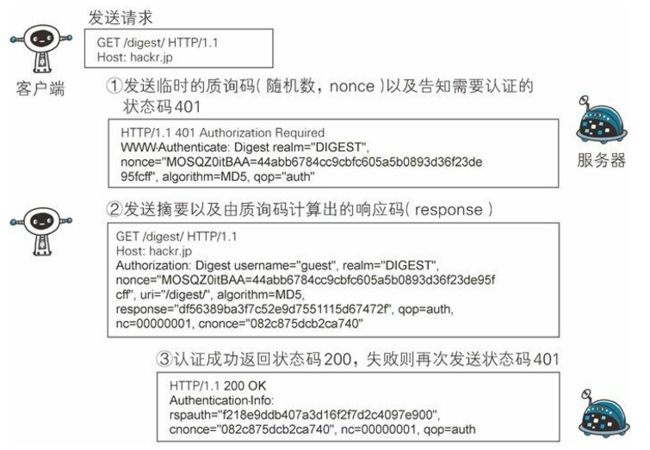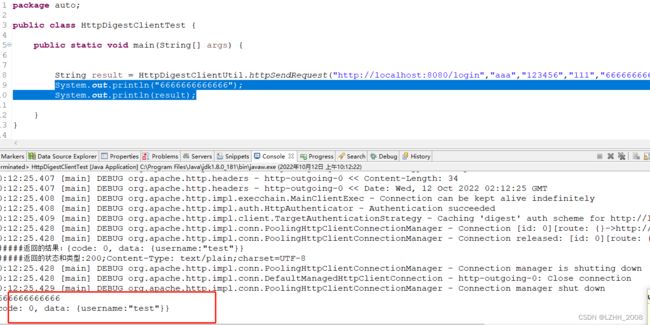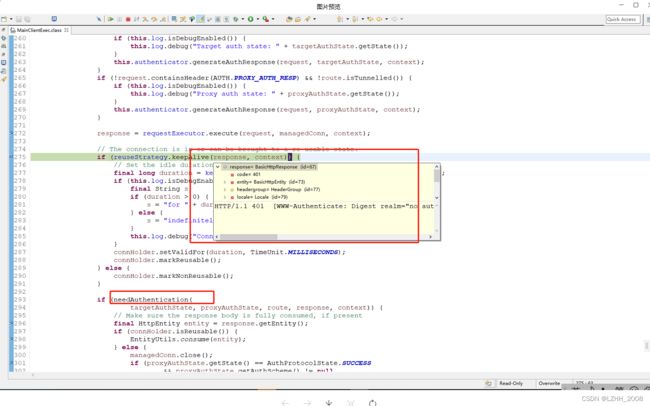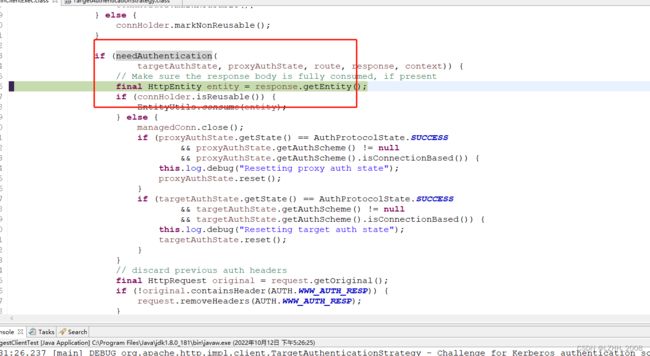HTTP的认证方式之DIGEST 认证(摘要认证)
核心步骤:
步骤 1: 请求需认证的资源时,服务器会随着状态码 401Authorization Required,返回带WWW-Authenticate 首部字段的响应。该字段内包含质问响应方式认证所需的临时质询码(随机数,nonce)。首部字段 WWW-Authenticate 内必须包含realm 和nonce 这两个字段的信息。客户端就是依靠向服务器回送这两个值进行认证的。nonce 是一种每次随返回的 401 响应生成的任意随机字符串。该字符串通常推荐由Base64 编码的十六进制数的组成形式,但实际内容依赖服务器的具体实现。
步骤 2:接收到401状态码的客户端,返回的响应中包含 DIGEST 认证必须的首部字段 Authorization 信息。首部字段 Authorization 内必须包含 username、realm、nonce、uri 和response的字段信息。其中,realm 和 nonce 就是之前从服务器接收到的响应中的字段。
username是realm 限定范围内可进行认证的用户名。
uri(digest-uri)即Request-URI的值,但考虑到经代理转发后Request-URI的值可能被修改因此事先会复制一份副本保存在 uri内。
response 也可叫做 Request-Digest,存放经过 MD5 运算后的密码字符串,形成响应码。
步骤 3:接收到包含首部字段 Authorization 请求的服务器,会确认认证信息的正确性。认证通过后则返回包含 Request-URI 资源的响应。并且这时会在首部字段 Authentication-Info 写入一些认证成功的相关信息。不过我下面的例子没有去写这个Authentication-Info,而是直接返回的数据。因为我实在session里缓存的认证结果。
校验 response 的算法 浏览器 Authorization 的内容举例:
Digest username="q", realm="test", nonce="T53sV+xXH3FrrER4YZwpFQ==", uri="/portal/applications",
response="f80492644b0700b404f2fb3f4d62861e", qop=auth, nc=00000001, cnonce="25c980f9f95fd544"
其中 response 是根据如下算法计算得到:
response = MD5(MD5(username:realm:password):nonce:nc:cnonce:qop:MD5(
服务端代码(SpringBoot项目):
自定义注解 RequireAuth
import java.lang.annotation.ElementType;
import java.lang.annotation.Retention;
import java.lang.annotation.RetentionPolicy;
import java.lang.annotation.Target;
/**
* 自定义注解 , 用于授权认证的拦截
*
* @author LZHH
*
* 2022年10月11日
*/
// can be used to method
@Retention(RetentionPolicy.RUNTIME)
@Target(ElementType.METHOD)
public @interface RequireAuth {
}拦截器 RequireAuthInterceptor
import java.text.MessageFormat;
import javax.servlet.http.HttpServletRequest;
import javax.servlet.http.HttpServletResponse;
import org.springframework.web.method.HandlerMethod;
import org.springframework.web.servlet.handler.HandlerInterceptorAdapter;
/**
* 拦截器 RequireAuthInterceptor
* @author LZHH
*
* 2022年10月11日
*/
public class RequireAuthInterceptor extends HandlerInterceptorAdapter {
// 为了 测试Digest nc 值每次请求增加
private int nc = 0;
@Override
public boolean preHandle(HttpServletRequest req, HttpServletResponse res, Object handler) throws Exception {
// 请求目标为 method of controller,需要进行验证
if (handler instanceof HandlerMethod) {
HandlerMethod handlerMethod = (HandlerMethod) handler;
Object object = handlerMethod.getMethodAnnotation(RequireAuth.class);
/* 方法没有 @RequireAuth 注解, 放行 */
if (object == null) {
return true; // 放行
}
/* 方法有 @RequireAuth 注解,需要拦截校验 */
// 没有 Authorization 请求头,或者 Authorization 认证信息验证不通过,拦截
if (!isAuth(req, res)) {
// 验证不通过,拦截
return false;
}
// 验证通过,放行
return true;
}
// 请求目标不是 mehod of controller, 放行
return true;
}
private boolean isAuth(HttpServletRequest req, HttpServletResponse res) {
String authStr = req.getHeader("Authorization");
System.out.println("请求 Authorization 的内容:" + authStr);
if (authStr == null || authStr.length() <= 7) {
// 没有 Authorization 请求头,开启质询
return challenge(res);
}
DigestAuthInfo authObject = DigestUtils.getAuthInfoObject(authStr);
// System.out.println(authObject);
/*
* 生成 response 的算法:
* response = MD5(MD5(username:realm:password):nonce:nc:cnonce:qop:MD5(:url))
*/
// 这里密码固定为 123456, 实际应用需要根据用户名查询数据库或缓存获得
String HA1 = DigestUtils.MD5(authObject.getUsername() + ":" + authObject.getRealm() + ":123456");
String HD = String.format(authObject.getNonce() + ":" + authObject.getNc() + ":" + authObject.getCnonce() + ":"
+ authObject.getQop());
String HA2 = DigestUtils.MD5(req.getMethod() + ":" + authObject.getUri());
String responseValid = DigestUtils.MD5(HA1 + ":" + HD + ":" + HA2);
// 如果 Authorization 中的 response(浏览器生成的) 与期望的 response(服务器计算的) 相同,则验证通过
System.out.println("Authorization 中的 response: " + authObject.getResponse());
System.out.println("期望的 response: " + responseValid);
if (responseValid.equals(authObject.getResponse())) {
/* 判断 nc 的值,用来防重放攻击 */
// 判断此次请求的 Authorization 请求头里面的 nc 值是否大于之前保存的 nc 值
// 大于,替换旧值,然后 return true
// 否则,return false
// 测试代码 start
int newNc = Integer.parseInt(authObject.getNc(), 16);
System.out.println("old nc: " + this.nc + ", new nc: " + newNc);
if (newNc > this.nc) {
this.nc = newNc;
return true;
}
return false;
// 测试代码 end
}
// 验证不通过,重复质询
return challenge(res);
}
/**
* 质询:返回状态码 401 和 WWW-Authenticate 响应头
*
* @param res 返回false,则表示拦截器拦截请求
*/
private boolean challenge(HttpServletResponse res) {
// 质询前,重置或删除保存的与该用户关联的 nc 值(nc:nonce计数器,是一个16进制的数值,表示同一nonce下客户端发送出请求的数量)
// 将 nc 置为初始值 0, 这里代码省略
// 测试代码 start
this.nc = 0;
// 测试代码 end
res.setStatus(401);
String str = MessageFormat.format("Digest realm={0},nonce={1},qop={2}", "\"no auth\"",
"\"" + DigestUtils.generateToken() + "\"", "\"auth\"");
res.addHeader("WWW-Authenticate", str);
return false;
}
}
注册拦截器 WebConfig
import org.springframework.context.annotation.Configuration;
import org.springframework.web.servlet.config.annotation.InterceptorRegistry;
import org.springframework.web.servlet.config.annotation.WebMvcConfigurer;
/**
* 注册拦截器 WebConfig
* @author LZHH
*
* 2022年10月11日
*/
@Configuration
public class WebConfig implements WebMvcConfigurer {
@Override
public void addInterceptors(InterceptorRegistry registry) {
RequireAuthInterceptor requireAuthInterceptor = new RequireAuthInterceptor();
registry.addInterceptor(requireAuthInterceptor);
}
}
DIGEST认证信息model类 DigestAuthInfo
/**
* DIGEST认证信息model类 DigestAuthInfo
* @author LZHH
*
* 2022年10月11日
*/
public class DigestAuthInfo {
private String username;
private String realm;
private String nonce;
private String uri;
private String response;
private String qop;
private String nc;
public String cnonce;
public String getUsername() {
return username;
}
public void setUsername(String username) {
this.username = username;
}
public String getRealm() {
return realm;
}
public void setRealm(String realm) {
this.realm = realm;
}
public String getNonce() {
return nonce;
}
public void setNonce(String nonce) {
this.nonce = nonce;
}
public String getUri() {
return uri;
}
public void setUri(String uri) {
this.uri = uri;
}
public String getResponse() {
return response;
}
public void setResponse(String response) {
this.response = response;
}
public String getQop() {
return qop;
}
public void setQop(String qop) {
this.qop = qop;
}
public String getNc() {
return nc;
}
public void setNc(String nc) {
this.nc = nc;
}
public String getCnonce() {
return cnonce;
}
public void setCnonce(String cnonce) {
this.cnonce = cnonce;
}
@Override
public String toString() {
return "DigestAuthInfo [username=" + username + ", realm=" + realm + ", nonce=" + nonce + ", uri=" + uri
+ ", response=" + response + ", qop=" + qop + ", nc=" + nc + ", cnonce=" + cnonce + "]";
}
}DIGEST认证的工具类 DigestUtils
import java.security.MessageDigest;
import java.security.NoSuchAlgorithmException;
import java.util.Base64;
import java.util.Random;
import org.junit.Test;
/**
* DIGEST认证的工具类 DigestUtils
* @author LZHH
*
* 2022年10月11日
*/
public class DigestUtils {
/**
* 根据当前时间戳生成一个随机字符串
* @return
*/
public static String generateToken() {
String s = String.valueOf(System.currentTimeMillis() + new Random().nextInt());
try {
MessageDigest messageDigest = MessageDigest.getInstance("md5");
byte[] digest = messageDigest.digest(s.getBytes());
return Base64.getEncoder().encodeToString(digest);
} catch (NoSuchAlgorithmException e) {
throw new RuntimeException();
}
}
@Test
public void testGenerateToken() {
// heL2WICEml8/UGfAQsS9mQ==
System.out.println(generateToken());
}
public static String MD5(String inStr) {
MessageDigest md5 = null;
try {
md5 = MessageDigest.getInstance("MD5");
} catch (Exception e) {
System.out.println(e.toString());
e.printStackTrace();
return "";
}
char[] charArray = inStr.toCharArray();
byte[] byteArray = new byte[charArray.length];
for (int i = 0; i < charArray.length; i++) {
byteArray[i] = (byte) charArray[i];
}
byte[] md5Bytes = md5.digest(byteArray);
StringBuffer hexValue = new StringBuffer();
for (int i = 0; i < md5Bytes.length; i++) {
int val = ((int) md5Bytes[i]) & 0xff;
if (val < 16)
hexValue.append("0");
hexValue.append(Integer.toHexString(val));
}
return hexValue.toString();
}
/**
* 该方法用于将 Authorization 请求头的内容封装成一个对象。
*
* Authorization 请求头的内容为:
* Digest username="aaa", realm="no auth", nonce="b2b74be03ff44e1884ba0645bb961b53",
* uri="/BootDemo/login", response="90aff948e6f2207d69ecedc5d39f6192", qop=auth,
* nc=00000002, cnonce="eb73c2c68543faaa"
*/
public static DigestAuthInfo getAuthInfoObject(String authStr) {
if (authStr == null || authStr.length() <= 7)
return null;
if (authStr.toLowerCase().indexOf("digest") >= 0) {
// 截掉前缀 Digest
authStr = authStr.substring(6);
}
// 将双引号去掉
authStr = authStr.replaceAll("\"", "");
DigestAuthInfo digestAuthObject = new DigestAuthInfo();
String[] authArray = new String[8];
authArray = authStr.split(",");
// System.out.println(java.util.Arrays.toString(authArray));
for (int i = 0, len = authArray.length; i < len; i++) {
String auth = authArray[i];
String key = auth.substring(0, auth.indexOf("=")).trim();
String value = auth.substring(auth.indexOf("=") + 1).trim();
switch (key) {
case "username":
digestAuthObject.setUsername(value);
break;
case "realm":
digestAuthObject.setRealm(value);
break;
case "nonce":
digestAuthObject.setNonce(value);
break;
case "uri":
digestAuthObject.setUri(value);
break;
case "response":
digestAuthObject.setResponse(value);
break;
case "qop":
digestAuthObject.setQop(value);
break;
case "nc":
digestAuthObject.setNc(value);
break;
case "cnonce":
digestAuthObject.setCnonce(value);
break;
}
}
return digestAuthObject;
}
}测试接口类 loginController
import javax.servlet.http.HttpServletRequest;
import javax.servlet.http.HttpServletResponse;
import org.springframework.stereotype.Controller;
import org.springframework.web.bind.annotation.RequestMapping;
import org.springframework.web.bind.annotation.ResponseBody;
@Controller
public class LoginController {
@RequireAuth
@RequestMapping("/login")
@ResponseBody
public String login(HttpServletRequest req, HttpServletResponse res) {
return "{code: 0, data: {username:\"test\"}}";
}
@RequireAuth
@RequestMapping("/index")
@ResponseBody
public String index(HttpServletRequest req, HttpServletResponse res) {
return "{code: 0, data: {xxx:\"xxx\"}}";
}
@RequestMapping("/index2")
@ResponseBody
public String index2(HttpServletRequest req, HttpServletResponse res) {
return "{code: 0, data: {666:\"666\"}}";
}
}
浏览器测试:
客户端接口测试
import org.apache.http.HttpResponse;
import org.apache.http.auth.AuthScope;
import org.apache.http.auth.UsernamePasswordCredentials;
import org.apache.http.client.CredentialsProvider;
import org.apache.http.client.methods.HttpPost;
import org.apache.http.entity.StringEntity;
import org.apache.http.impl.client.BasicCredentialsProvider;
import org.apache.http.impl.client.CloseableHttpClient;
import org.apache.http.impl.client.HttpClients;
import org.apache.http.util.EntityUtils;
import java.io.IOException;
import java.net.URI;
/**
* HTTP摘要认证
*
**/
public class HttpDigestClientUtil {
public static String httpSendRequest(String url, String userName, String passWord, String param, String headValue) {
CloseableHttpClient httpClient = null;
String result = null;
try {
URI serverURI = new URI(url);
CredentialsProvider credsProvider = new BasicCredentialsProvider();
credsProvider.setCredentials(new AuthScope(serverURI.getHost(), serverURI.getPort()),
new UsernamePasswordCredentials(userName, passWord));
httpClient = HttpClients.custom().setDefaultCredentialsProvider(credsProvider).build();
HttpPost post = new HttpPost(url);
// 构造消息头
post.setHeader("Content-type", "application/json; charset=utf-8");
if (headValue != null)
post.setHeader("User-Identify", headValue);
post.setEntity(new StringEntity(param, "UTF-8"));// JSON 参数
HttpResponse response = httpClient.execute(post);
result = EntityUtils.toString(response.getEntity());
System.out.println("######返回的结果:"+ result);
System.out.println("######返回的状态和类型:"+ response.getStatusLine().getStatusCode()+";"+response.getEntity().getContentType());
EntityUtils.consume(response.getEntity());
httpClient.close();
} catch (Exception e) {
e.printStackTrace();
} finally {
if (httpClient != null) {
try {
httpClient.close();
} catch (IOException e) {
e.printStackTrace();
}
}
}
return result;
}
}
直接调用接口:
public class HttpDigestClientTest {
public static void main(String[] args) {
String result = HttpDigestClientUtil.httpSendRequest("http://localhost:8080/login","aaa","123456","111","66666666666666");
System.out.println("6666666666666");
System.out.println(result);
}
}结果:
通过接口调用只请求一次,其实是httpClient架包里面有判断,发现接口返回401,需要认证的时候,会再次加上摘要再次请求接口。
参考:HTTP的几种认证方式之DIGEST 认证(摘要认证) - wenbin_ouyang - 博客园





